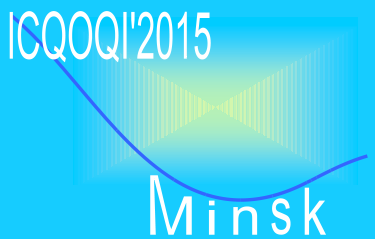The first All-Union Seminar on Quantum Optics (SQO) was from
May 19 to 22, 1986, in Minsk at the Institute of Physics. This
seminar was organized and held in view of the actuality of the
problems of quantum optics - the part of optics dealing with
electromagnetic fields and their interactions with matter, in
which the quantum nature of light is manifested - proposed for
discussion.
Indeed, the seminar coincided with the appearance of
the first experimental works on the generation of squeezed states
of optical fields [Slusher (1985), Shelby (1986), Kimble (1986)]
and works by Yamamoto (1986) with a demonstration of the
sub-Poissonian distribution of photoelectrons in the detection of
radiation of a semiconductor laser with a feedback circuit. It
was the questions of producing sub-Poissonian and squeezed light
that were the subject of three meetings of the section
"Quantum Statistics of Nonlinear Processes."
Review
reports by S.Ya. Kilin (Institute of Physics of the Belarussian
Academy of Sciences, IP BAS), "Quantum Statistics of
Resonant Light Scattering and Propagation Effects," in which
squeezing phenomena in four-wave scattering were considered; A.S.
Troshin (Leningrad State Pedagogical Institute, LSPI),
"Antibunching and Sub-Poissonian Statistics of Photons,
Squeezed States: Recent Advances and Forecasts;" Yu.M.
Golubev and V.R. Gorbachev (Leningrad State University, LSU),
"Formation of Sub-Poissonian Statistics of Light and
Squeezed States in Parametric Interaction with a Medium;"
and Yu.M.Golubev and I.V. Sokolov (LSU), "Quantum Mechanical
Optical Oscillator with Sub-Poissonian Statistics" were
delivered. A number of reports were devoted to the problem of
manifestation of photon antibunching in the spectrum of intensity
fluctuations [L.I. Plimak and E.S. Polzik (LSU) and A.S. Troshin
and N.I. Katanaev (LSPI)].
The theory of amplification of light
with sub-Poissonian statistics was the subject of a report by
M.I. Kolobov and I.V. Sokolov (LSU). Another problem discussed at
SQO-I was that of the nonlinearity and non-Markov behaviour of
relaxation associated with the fact that the response of
relaxation perturbations is not instantaneous.
First experimental
evidence of deviations from predictions of the Bloch theory of
relaxation and the relaxation dynamics obtained in the works by
De Voe and Brewer (1983) and other special features of relaxation
processes, including those in strong fields, frequency-
phase-correlated, and multimode ones became the subject of
discussion of the reports by P.A. Apanasevich, S.Ya. Kilin and
A.P.Nizovtsev (IP BAS), Yu.A. Ponomarev (Institute of Optics of
the Atmosphere, Siberian Division of the Academy of Sciences of
the USSR, IOA SD AS USSR), E.G. Pestov (Lebedev Physical
Institute, FIAN), S.l. Yakovlenko and A.G. Zhidkov (Institute of
General Physics of the Academy of Sciences of the USSR, IGF AS
USSR), S.G. Przhibel'skii and N.A.Chigir' (Vavilov State Optical
Institute, SOI), E.E. Fradkin (LSU), S.K. Potapov (Saratov State
University, SSU), V.l. Kruglov (IP BAS), V.A. Savva (IP BAS), and
V.S. Kuz'min and A.R Saiko (Institute of Solid State and
Semiconductor Physics of the Belarussian Academy of Sciences,
ISSSP BAS).
These reports formed the basis for a topical issue of
Journal of Applied Spectroscopy (Zh. Prikl.
Spektr., 1987, vol. 47, no. 6).
